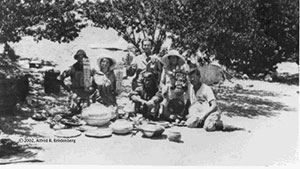
Natalie Curtis was born on April 26, 1876 in New York City. She was the daughter of socialites Edward Curtis of Providence, Rhode Island and August Lawler Stacy Curtis of Chester, Pennsylvania. Natalie Curtis’s family tree includes ties to two early colonists, Henry and Mary Curtis, who arrived in Sudbury, Massachusetts in 1636, and also to the prominent Curtis and Burrill families of Providence. Her paternal grandfather, George Curtis (1796-1856), established the family fortune as a successful banker in Providence and later in New York City. Her great grandfather, James Burrill (1772- 1820),held the offices of Rhode Island Attorney General from 1797 to 1814, State Representative from 1813 to 1816, Speaker of the State Assembly from 1814 to 1816, Chief Justice of the State Supreme Court in 1816, and U.S Senator from 1817 to 1820.In the early twentieth century, Natalie Curtis embarked on a pioneering quest to reveal the roots of "true" American identity, which she believed originated in Native American life. Along the way, Curtis not only became an advocate and chronicler of Native American and African American music and culture, but also discovered her own individuality. She hoped to protect these traditional cultures from oblivion in an increasingly modern society and to present their value to broader audiences. However, in spite of her efforts, Curtis remained a product of her time, struggling to negotiate between traditional beliefs about gender and race and avant-gardism.
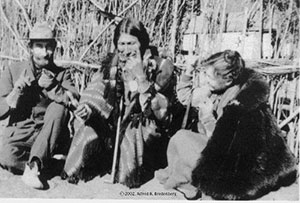 As a child, Curtis’s affluent, politically connected, and highly educated family envisioned a distinctly traditional role for their daughter as an ideal Victorian woman. However, Curtis also lived through a time of dramatic modernization that would ultimately lead her down an unconventional career path. Curtis grew up hearing male family elders discuss the political, social, economic changes happening all around them. As the momentum of industrialization transformed the world, traditional elite Anglo-Protestant families such as the Curtis’s faced new challenges in maintaining the power and influence they previously held in America. They discussed the flood of immigrants pouring into America and contemplated the innovations and industrialization that transformed society. Further, social class divisions became more defined and urbanization overwhelmed traditional elite neighborhoods. The modern world challenged the old.
As a child, Curtis’s affluent, politically connected, and highly educated family envisioned a distinctly traditional role for their daughter as an ideal Victorian woman. However, Curtis also lived through a time of dramatic modernization that would ultimately lead her down an unconventional career path. Curtis grew up hearing male family elders discuss the political, social, economic changes happening all around them. As the momentum of industrialization transformed the world, traditional elite Anglo-Protestant families such as the Curtis’s faced new challenges in maintaining the power and influence they previously held in America. They discussed the flood of immigrants pouring into America and contemplated the innovations and industrialization that transformed society. Further, social class divisions became more defined and urbanization overwhelmed traditional elite neighborhoods. The modern world challenged the old.
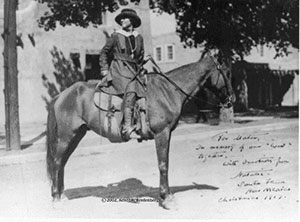 However, gender roles for well-off women remained mostly unchanged. Ideas about women’s access to formal education and professional careers remained restrictive, therefore preventing Curtis from fully exploring this new America. As expected for a girl of her social standing, Curtis spent her youth cultivating high-society skills. She developed a passion for music as it allowed her to experience personal freedom; she frequented the opera and studied classical piano in the United States and Europe.
However, gender roles for well-off women remained mostly unchanged. Ideas about women’s access to formal education and professional careers remained restrictive, therefore preventing Curtis from fully exploring this new America. As expected for a girl of her social standing, Curtis spent her youth cultivating high-society skills. She developed a passion for music as it allowed her to experience personal freedom; she frequented the opera and studied classical piano in the United States and Europe.
Yet wealth, privilege, and the preoccupation of music could not shield her from the outside world. As a young adult, she became aware of the social and cultural transformations that were reshaping America. She realized the gender barriers that limited her opportunities to professionally compose music and perform in public. Like many of her female contemporaries, she struggled to define her own identity.
In 1900, Curtis had a life changing experience. While visiting her brother in Arizona, Curtis experienced her first contact with Native American cultures. She developed a strong fascination with what the Southwestern hospitality business owner Fred Harvey promoted as a place “inhabited by peaceful, pastoral people, ‘living ruins’ from the childhood of civilization.” She also discovered a vibrant community of young intellectuals in the area. Some included young women from the East Coast that traveled to the Southwest in search of freedom from the prescribed domestic role. For others, the Southwest became a haven for exploring views that contrasted the moralistic and assimilationist beliefs of the day with the cultural pluralism of the modern world. Consequently, Curtis adopted an emerging theory that argued that the true American spirit could not be found in the urban factory, but instead in the varied folk cultures of America.For the next seven years, Curtis searched for the authentic American identity that she believed originated in Native American music and culture. Initially, she faced obstacles because her mission conflicted with government policies pertaining to Native Americans. Since the Bureau of Indian Affairs at the time wanted Native Americans to assimilate into the white culture, Indians were prohibited from singing native songs in public schools and warned not record their music. Using her family's connections and influence, Curtis appealed to President Theodore Roosevelt to remove the ban that suppressed Native American cultural expression. Roosevelt granted her request and authorized her to have substantial privileges on Indian reservations. As a result, she studied, recorded, and transcribed the traditions and culture of the Hopi, Pueblo, Navajo, and several other tribes. She wrote magazine articles on Native American music and in 1905, she published Songs of Ancient America. In 1907, she published The Indian’s Book, a collection of over two hundred transcribed songs from eighteen tribes, as well as Native American photographs, artwork, and folk stories.
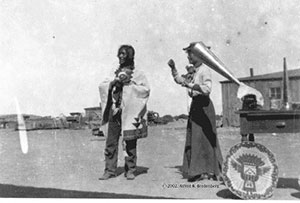 In 1914, Curtis met Paul Burlin,an aspiring artist, and they married in 1917. The couple moved to Virginia where Curtis continued her research on Native Americans and also began to explore African American music and culture at the Hampton Institute. She published Negro Folk Songs in 1919 and Songs and Tales from the Dark Continent in 1920. While her work received acclaim both in America and France, some disparaged her abilities and research because of her gender and lack of scholarly training.
In 1914, Curtis met Paul Burlin,an aspiring artist, and they married in 1917. The couple moved to Virginia where Curtis continued her research on Native Americans and also began to explore African American music and culture at the Hampton Institute. She published Negro Folk Songs in 1919 and Songs and Tales from the Dark Continent in 1920. While her work received acclaim both in America and France, some disparaged her abilities and research because of her gender and lack of scholarly training.
In 1921, the couple moved to Paris in order to introduce her research to broader audiences. In autumn, while speaking at the International Congress of Art History Convention in Paris, Curtis debated Harvard professor Edward Burlingame Hill, who argued that America had no folk music and challenged the idea that Native and African American music could be classified as American. Curtis countered his claim by singing Native American songs and arguing
“[the nation’s twelve million blacks] who are good enough ‘Americans’ to die for American ideals in our wars [and are] completely loyal and unhyphenated Americans, whose blood and brawn have gone into the upbuilding of our whole great South were more than qualified to be American. If those songs that are the very voice of our South are not American, what is!”
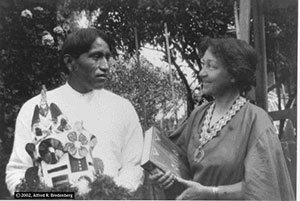 The audience praised her assertions and her future as a specialist in the field looked bright. Unfortunately, on October 23, 1921, her life came to a tragic end when a car hit her as she stepped off a streetcar. She died hours later at a Paris hospital. Curtis’s sudden death devastated her family and husband. She was cremated and her remains were buried in her father’s family plot at the North Burial Ground, Providence, Rhode Island.
The audience praised her assertions and her future as a specialist in the field looked bright. Unfortunately, on October 23, 1921, her life came to a tragic end when a car hit her as she stepped off a streetcar. She died hours later at a Paris hospital. Curtis’s sudden death devastated her family and husband. She was cremated and her remains were buried in her father’s family plot at the North Burial Ground, Providence, Rhode Island.
Today, Natalie Curtis Burlin receives both criticism and admiration from scholars and champions of Native American and African American cultures. Some accuse Curtis of racial essentialism because she described Native and African Americans as "child-like." Others disapprove of her unempirical approach to analyzing folk music. In spite of these criticisms, some argue that her work in preserving Native and African American culture influenced the Harlem Renaissance in the 1920s and assisted in the increased awareness and respect for Indian cultures that developed during the New Deal in the 1930s. Further, the story of Natalie Curtis Burlin highlights the restrictions women faced in pursuing careers in the early twentieth century
Michelle Valletta, M.A. Rhode Island College
Further Reading
Patterson, Michelle Wick. Natalie Curtis Burlin: A Life in Native and African American Music. Lincoln: University of Nebraska Press, 2010.
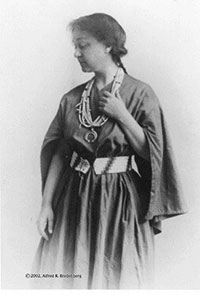 Natalie Curtis Burlin, an amateur ethnomusicologist, anthropologist, folklorist, and a descendant of the prominent Curtis and Burrill families of Providence, was born in New York City on April 26, 1876. In the early twentieth century, Burlin’s search for original American identity among Native Americans conflicted with government regulations that prohibited Native American cultural practices. Burlin appealed to President Theodore Roosevelt to lift the bans and Roosevelt granted her request and also gave her substantial privileges on Indian reservations. As a result, she studied and recorded the cultural traditions of several Indian tribes. She published Songs of Ancient America (1905)and The Indian’s Book (1907). In 1917, she married artist Paul Burlin. The couple moved to Virginia where Natalie worked at the Hampton Institute researching Native and African American culture. She published Negro Folk Songs (1919) and Songs and Tales from the Dark Continent (1920). In 1921, the Burlin’s moved to Paris and presented Natalie’s research to broader audiences. Unfortunately on October 23, 1921, Natalie Burlin was fatally wounded exiting a streetcar. During her lifetime, Burlin’s work received acclaim in America and France, however many older male anthropologists criticized her abilities and research. Today, Burlin’s work still arouses both criticism and admiration. Some accuse her of racial essentialism; others disapprove of her unempirical approach to folk music analysis. But her work in preserving Native and African American cultural forms influenced the 1920s Harlem Renaissance and increased awareness and respect for Native American cultures. Read More...
Natalie Curtis Burlin, an amateur ethnomusicologist, anthropologist, folklorist, and a descendant of the prominent Curtis and Burrill families of Providence, was born in New York City on April 26, 1876. In the early twentieth century, Burlin’s search for original American identity among Native Americans conflicted with government regulations that prohibited Native American cultural practices. Burlin appealed to President Theodore Roosevelt to lift the bans and Roosevelt granted her request and also gave her substantial privileges on Indian reservations. As a result, she studied and recorded the cultural traditions of several Indian tribes. She published Songs of Ancient America (1905)and The Indian’s Book (1907). In 1917, she married artist Paul Burlin. The couple moved to Virginia where Natalie worked at the Hampton Institute researching Native and African American culture. She published Negro Folk Songs (1919) and Songs and Tales from the Dark Continent (1920). In 1921, the Burlin’s moved to Paris and presented Natalie’s research to broader audiences. Unfortunately on October 23, 1921, Natalie Burlin was fatally wounded exiting a streetcar. During her lifetime, Burlin’s work received acclaim in America and France, however many older male anthropologists criticized her abilities and research. Today, Burlin’s work still arouses both criticism and admiration. Some accuse her of racial essentialism; others disapprove of her unempirical approach to folk music analysis. But her work in preserving Native and African American cultural forms influenced the 1920s Harlem Renaissance and increased awareness and respect for Native American cultures. Read More...
 As a child, Curtis’s affluent, politically connected, and highly educated family envisioned a distinctly traditional role for their daughter as an ideal Victorian woman. However, Curtis also lived through a time of dramatic modernization that would ultimately lead her down an unconventional career path. Curtis grew up hearing male family elders discuss the political, social, economic changes happening all around them. As the momentum of industrialization transformed the world, traditional elite Anglo-Protestant families such as the Curtis’s faced new challenges in maintaining the power and influence they previously held in America. They discussed the flood of immigrants pouring into America and contemplated the innovations and industrialization that transformed society. Further, social class divisions became more defined and urbanization overwhelmed traditional elite neighborhoods. The modern world challenged the old.
As a child, Curtis’s affluent, politically connected, and highly educated family envisioned a distinctly traditional role for their daughter as an ideal Victorian woman. However, Curtis also lived through a time of dramatic modernization that would ultimately lead her down an unconventional career path. Curtis grew up hearing male family elders discuss the political, social, economic changes happening all around them. As the momentum of industrialization transformed the world, traditional elite Anglo-Protestant families such as the Curtis’s faced new challenges in maintaining the power and influence they previously held in America. They discussed the flood of immigrants pouring into America and contemplated the innovations and industrialization that transformed society. Further, social class divisions became more defined and urbanization overwhelmed traditional elite neighborhoods. The modern world challenged the old. However, gender roles for well-off women remained mostly unchanged. Ideas about women’s access to formal education and professional careers remained restrictive, therefore preventing Curtis from fully exploring this new America. As expected for a girl of her social standing, Curtis spent her youth cultivating high-society skills. She developed a passion for music as it allowed her to experience personal freedom; she frequented the opera and studied classical piano in the United States and Europe.
However, gender roles for well-off women remained mostly unchanged. Ideas about women’s access to formal education and professional careers remained restrictive, therefore preventing Curtis from fully exploring this new America. As expected for a girl of her social standing, Curtis spent her youth cultivating high-society skills. She developed a passion for music as it allowed her to experience personal freedom; she frequented the opera and studied classical piano in the United States and Europe. In 1914, Curtis met Paul Burlin,an aspiring artist, and they married in 1917. The couple moved to Virginia where Curtis continued her research on Native Americans and also began to explore African American music and culture at the
In 1914, Curtis met Paul Burlin,an aspiring artist, and they married in 1917. The couple moved to Virginia where Curtis continued her research on Native Americans and also began to explore African American music and culture at the  The audience praised her assertions and her future as a specialist in the field looked bright. Unfortunately, on October 23, 1921, her life came to a tragic end when a car hit her as she stepped off a streetcar. She died hours later at a Paris hospital. Curtis’s sudden death devastated her family and husband. She was cremated and her remains were buried in her father’s family plot at the North Burial Ground, Providence, Rhode Island.
The audience praised her assertions and her future as a specialist in the field looked bright. Unfortunately, on October 23, 1921, her life came to a tragic end when a car hit her as she stepped off a streetcar. She died hours later at a Paris hospital. Curtis’s sudden death devastated her family and husband. She was cremated and her remains were buried in her father’s family plot at the North Burial Ground, Providence, Rhode Island.